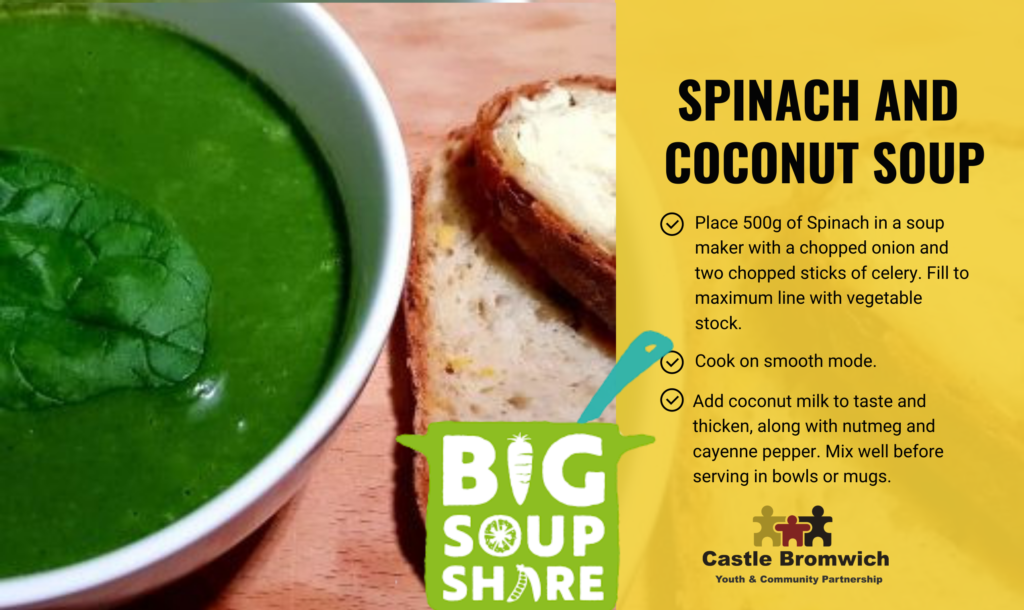Food Is Not a Moral Issue – The Pleasure and Anxiety of Eating
Asking people for their favourite soup recipes has sparked some interesting discussions about the importance of food in our lives, not only for nutrition, but also how it is integral to both how we view ourselves and how others see us.
Today’s recipe is from a Fordbridge resident who told us that as a child they felt that they were judged to be part of a bad family based on the food they ate. This provoked some food anxiety and they set out to eat a “healthy diet”. Their recipe of Spinach and Coconut Soup was influenced by childhood viewings of Popeye and his consumption of Spinach. It firmly set in their mind that Popeye was a good person, not only because of his behaviour, but because he consumed healthy, nutritious food.

Food in our house was determined by what you could forage and what was cheap and filling. I always felt that this made me lacking compared to my wealthier friends. I realised that food had a hierarchy. My mother would come in from working in a factory and hurriedly prepare thick slices of crusty bread and dripping sprinkled with salt. They were served from a cracked pottery plate in the middle of the table. I’d jostle with my brothers and sisters for the best slices. We’d eat them from our hands, without a side plate to place them on. We were noisy, boisterous and, despite my mother’s best efforts, lacking any pretensions of table manners. Such simple food provided us with enormous pleasure.
My best friend’s father was a Wing Commander in the RAF. Tea in their house was very different. Their mother didn’t work and cooking was more than a necessity, it was something she took pleasure from; or so it seemed to me at the time. Tea was dainty triangular cut ham and tomato sandwiches served on individual bone china plates. These were followed by iced fruit cakes and a piece of fruit.
I once over-heard some teachers talking about the food that children took into school. They were quite disparaging about parents who allowed children to take the contents that would fill my lunch box. There was a moral judgement made that they were some how bad people because of the food they “chose” to feed their children. As I got older, I realised that the type of food that I was eating wasn’t the only thing that was being judged, but also my lack of refinement in the way that I consumed it. My lack of etiquette seems to equate in other’s minds to moral degeneration.
I remember that this started to play on my mind, and I asked my father to get an allotment where we could grow vegetables. And, that’s what we did. I’m not sure that our meals changed dramatically, but they were always served with plenty of vegetables. And, bread and dripping alternated with bowls of hot vegetable soup in winter and tomato salads in the summer.
As an adult I realise that things were not quite as black and white as I thought as a child. My friend’s mother didn’t enjoy cooking. She also felt judged and pressurised to perform the role of the “good mother”. Even the upper classes felt the need to conform, sending their children to finishing school to learn the social requirements of food preparation, serving and etiquette. Despite this realisation, I’m still fearful about how my food choices might be judged. I rarely eat outside my own home and choose to shop online rather than face the critical eyes of others’ judging the contents of my food trolley. There is a voice in my head that constantly repeats the middle class mantra, “It’s just as cheap to eat healthily.” But, I am reminded of George Orwell’s “The Road to Wigan Pier”:
“Would it not be better if they spent more money on wholesome things like oranges and wholemeal bread or if they even, like the writer of the letter to the New Statesman, saved on fuel and ate their carrots raw? Yes, it would, but the point is that no ordinary human being is ever going to do such a thing. The ordinary human being would sooner starve than live on brown bread and raw carrots. And the peculiar evil is this, that the less money you have, the less inclined you feel to spend it on wholesome food. A millionaire may enjoy breakfasting off orange juice and Ryvita biscuits; an unemployed man doesn’t. Here the tendency of which I spoke at the end of the last chapter comes into play. When you are unemployed, which is to say when you are underfed, harassed, bored, and miserable, you don’t want to eat dull wholesome food. You want something a little bit ‘tasty’. There is always some cheaply pleasant thing to tempt you.”

